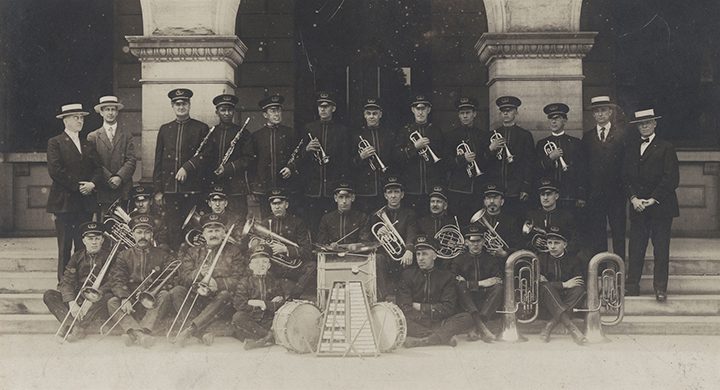Inducted in 2012
The Michigan Central Railroad Employees Band, founded in 1919, consisted primarily of employees of the Michigan Central Railroad. At a time when this was uncommon, it was an inter-racial organization with a clarinet player, Peter Powless, from the Muncey Reserve in Elgin County. Band members held such jobs as machinist, upholsterer, foreman, electrician, bookkeeper, mechanic and general labourer. It enjoyed support from the upper management of the MCRR. Ellsworth Webb, who was honorary president, directed the operations of the Michigan Central’s divisional shops in St. Thomas. Paul Cain, band president, was in charge of blacksmithing. Clarence Adams, honorary secretary, was the locomotive foreman at the Locomotive Repair Shops (built 1913). His rise within the organization was typical, having begun as an apprentice, becoming a machinist in 1907, and later roundhouse foreman.
St. Thomas was the divisional headquarters for the Michigan Central and thus an important centre for the repair and servicing of locomotives, replenishing of water and fuel, and for passenger dining. The MCRR was the biggest employer in the city. The band, which consisted of more than 20 members, played at special events for the company, such as the launch of locomotives or the arrival of dignitaries, and celebrations within the city such as holidays. The band also played beyond St. Thomas, for example, taking the train to Ridgetown for a 1929 performance. The MCR Band gave the opportunity for local musicians to improve their talents, contribute to the local cultural scene, entertain their fellow workers and have musical fun while so doing.
Some members went on to careers in the music business. Alex Demcie, who was a percussionist in the Band, was an electrician for the MCR. He later served as local secretary for the American Federation of Musicians.
The late 19th and first half of the 20th centuries were the heyday of brass bands. There were town bands, company bands and military bands. The MCR Band was described by the St. Thomas Times-Journal as “one of the leading musical organizations in Western Ontario”. Considered worthy of municipal support, the Band received a grant of $400 in 1920.


